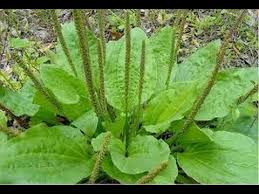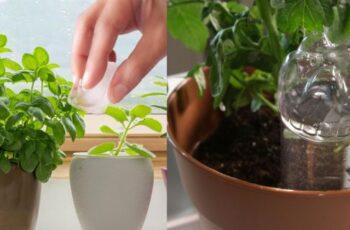Ad Blocker Detected
Our website is made possible by displaying online advertisements to our visitors. Please consider supporting us by disabling your ad blocker.
Plantago major, also known as the plantain weed, is considered a garden nuisance by many people. Fewer people know that the common plantain weed has some surprising benefits as a herb.

After all, what is a weed except a plant that is growing in the “wrong” place?
The plantain weed goes by several other names, such as white man’s foot, rabbit ears, dooryard plantain, greater plantain, and broadleaf plantain.
It differs from the banana-like fruit that is called a plantain (Musa paradisiacal); the two are unrelated. Native to the Eurasian continent, broadleaf plantain now grows in many parts of the world, including the United States and Canada.
The leaves of the plant are not only edible but actually highly nutritious. Read on to learn more about the benefits of this common garden plant.
Here are 12 of the greatest health benefits of broadleaf plantain.
12. Erase the Itch of Insect Stings
Katie, who is an expert in herbals, said that the broadleaf plantain can be used as a topical remedy for insect bites. She recommends putting the leaves in hot water as you would do with tea and applying the tea to the insect bite.
Katie writes that the leaves have natural anti-inflammatory properties that help relieve the itching, burning, and stinging associated with insect bites.
In addition, the plant has antibacterial and antimicrobial properties, so using plantain weed as a topical remedy for an insect sting makes it less likely that the area will become infected.
11. Help Wounds Heal Faster
Some of the properties in plantain leaves can be used topically to help wounds heal faster. The chemical in the leaves responsible for their wound-healing property is allantoin. It encourages new skin cells to regenerate at the wound site, helping the wound to close more quickly.
The leaves of the plantain weed also contain tannin, a natural anti-inflammatory chemical that causes tissues to shrink or contract. This is important for wound healing because it helps the wound to close so that it can begin to knit together.
It’s also useful for helping draw out splinters and small shards of glass if they should ever become stuck under the skin.
10. Soothe the Coughing and Aching of Bronchitis
Dr. Edward Group DC writes that upper respiratory tract complaints are one of the most common uses for plantain weed as folk medicine. Plantain weed leaves act as a demulcent, which is a substance that temporarily coats irritated mucous membranes and thus protects them from irritation.
Less irritation leads to less coughing.
9. Relieve a Toothache
According to Margaret L. Ahlborn, another common use for broadleaf plantain in folk medicine is for soothing a toothache. The traditional way to ease toothache pain was to apply the dried, ground root to the sore tooth; this is safe because all parts of the broadleaf plantain plant, including the root, are edible.
If powdering the root is too lengthy a process, though, one can simply dig up, wash thoroughly, and chew a piece of the root in the part of the mouth that aches.

